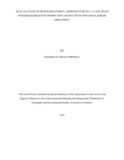| dc.description.abstract | The study sought to establish the adoption of renewable energy in Kenya based on a case study of biomass briquette production and its use in industrial boiler operations. Among the specific objectives, the study was to evaluate potential environmental impacts in the production of biomass fuel briquettes, to determine the social-economic benefits accrued from the production of fuel briquettes, to determine how cost of fossil fuel influences the adoption of biomass briquette use and to measure the proportion of volatile matter, moisture content, ash content and fixed carbon in biomass fuel briquettes. The research study was carried out in four counties in Kenya namely; Kisumu County, Meru County, Nairobi County and Kiambu County. Briquette manufacturing was taking place in Kisumu County while its use in boiler operations was taking place in the counties of Meru, Nairobi and Kiambu. The study employed both qualitative and quantitative research designs. Field surveys and statistical analyses were used which enabled collection of relevant data for testing research hypotheses. Field surveys and in-depth interviews were helpful in defining and developing approaches to the problems. Statistical analyses were used to quantify the problems and understand how prevalent they are by looking for projectable results to the larger population. This type of data was organized and presented in form of graphs, tables, averages, maps and other statistical presentations. The hypotheses of the study were tested using chi square and Z-test.
The study found that majority of the respondents (68%) agreed that the production and adoption of fuel briquettes in boiler operations has to a number of socio-economic benefits such as infrastructure development and employment creation. The study did a correlation Analysis of cost of fossil fuel and biomass briquette and found that high cost of fossil fuel variable scores go with high tonnage briquette used variable scores and vice versa. The study also found that when prices of Heavy Fuel Oil go down boiler operators preferred to run fossil operated boilers as opposed to biomass boilers. The research also carried out proximate analysis of the biomass briquettes made of (40%) sawdust and (60%) bagasse. Possible actions to improve production of biomass briquettes and its adoption in boiler operations have been suggested. This includes enactment of policies that will regulate the use and cost of Heavy Fuel Oil and policies that will encourage investment in briquette production. Avenues for further research have also been explored and explained. | en_US |



